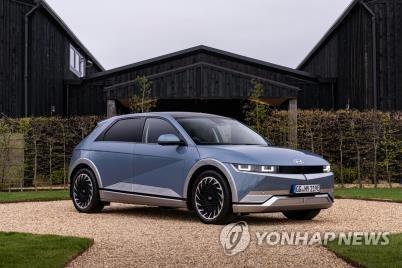- California Assembly OKs highest minimum wage in nation
- S. Korea unveils first graphic cigarette warnings
- US joins with South Korea, Japan in bid to deter North Korea
- LPGA golfer Chun In-gee finally back in action
- S. Korea won’t be top seed in final World Cup qualification round
- US men’s soccer misses 2nd straight Olympics
- US back on track in qualifying with 4-0 win over Guatemala
- High-intensity workout injuries spawn cottage industry
- CDC expands range of Zika mosquitoes into parts of Northeast
- Who knew? ‘The Walking Dead’ is helping families connect
Hyundai, Kia’s U.S. sales fall 13 pct on chip shortage

This file photo, provided by Hyundai Motor, shows the all-electric IONIQ 5 model. (PHOTO NOT FOR SALE) (Yonhap)
Hyundai Motor Co. and its affiliate Kia Corp. said Thursday their combined sales in the United States fell 13 percent last month from a year earlier amid the global chip shortage.
Hyundai and Kia sold a total of 89,663 vehicles in the world’s most important automobile market in November from 103,068 units a year ago, according to the companies’ sales data.
Hyundai’s U.S. sales fell 20 percent to 44,345 units from 55,171 over the cited period, while Kia’s declined 5.4 percent to 45,318 from 47,897.
“Lingering availability issues persisted into November, but we are optimistic that we will close the year strong,” Randy Parker, senior vice president in charge of national sales at Hyundai Motor America, said in a statement.
From January to November, their sales rose 23 percent to 1.34 million units from 1.09 million in the same period of last year, the data showed.
Robust demand for Hyundai’s Tucson SUV, all-electric IONIQ 5 and Nexo hydrogen fuel cell electric models, and Kia’s Telluride and Sportage SUVs buoyed sales in the first 11 months.
“With the all-new Kia EV6 arriving soon, and the Sportage, including hybrid and plug-in hybrid models, arriving throughout the first half of 2022, we are confident that the interest in Kia will not wane anytime soon,” Eric Watson, vice president in charge of Kia America’s sales operations, said in a statement.
To reflect the supply-side issues, Hyundai recently revised down its sales target to 4 million vehicles for the year from 4.16 million units. Last year, it sold 3.74 million autos.
Kia expected it won’t achieve this year’s sales target of 2.92 million units due to the parts problems. It sold 2.6 million units last year.
Hyundai and Kia together form the world’s fifth-biggest carmaker by sales.
U.S. sales figures for Hyundai’s independent Genesis brand were not immediately available.











